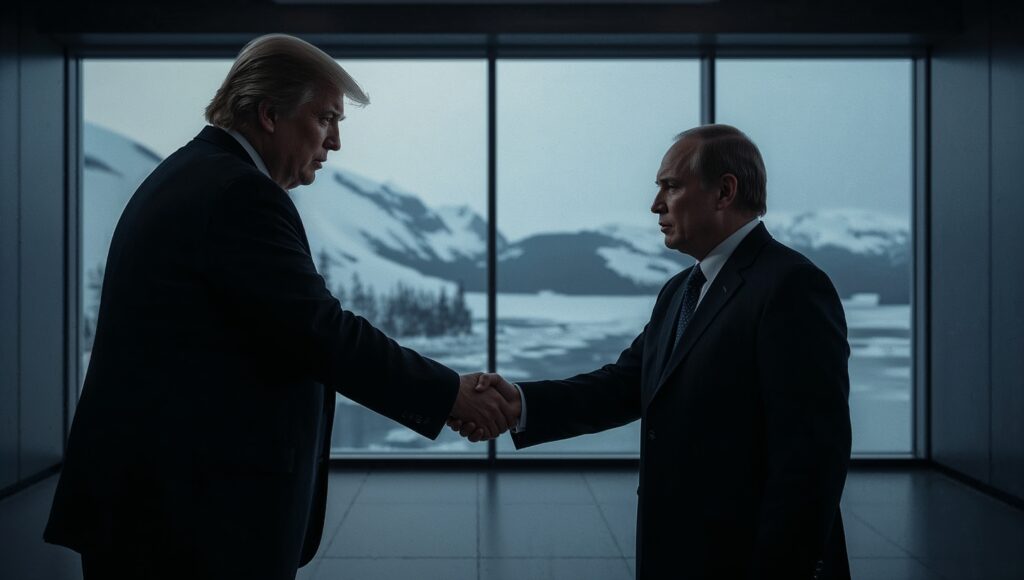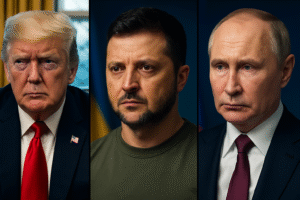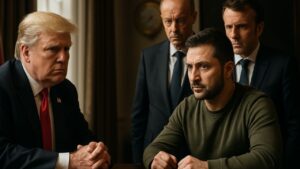Alaska Summit Concludes Without Peace Deal, Granting Putin a Strategic Advantage in Ukraine

U.S. President Donald Trump and Russian President Vladimir Putin shake hands during their summit in Anchorage, Alaska, on August 15, 2025.
ANCHORAGE, ALASKA – The highly anticipated summit between U.S. President Donald Trump and Russian President Vladimir Putin concluded Friday without a concrete peace deal or ceasefire for the war in Ukraine, an outcome that gifts Moscow valuable time to press its military advantage before weather conditions worsen in the fall. The meeting, held at Joint Base Elmendorf-Richardson, marked a significant shift in the U.S. approach to the conflict.
The push for an immediate ceasefire has been replaced by a call for a “quick, enduring peace deal,” a change that aligns with Putin’s strategic objectives and buys his forces a critical window for advances before mid-October. The diplomatic pivot places immense pressure on Ukrainian President Volodymyr Zelensky, who was not invited to the Trump Putin Alaska summit and is scheduled to meet with Trump in Washington D.C. on Monday.
For Russia, the summit was a significant diplomatic and public relations victory. President Trump welcomed Putin with a “red carpet” and a “spontaneous burst of applause,” later telling Fox News he rated the meeting a “10” and that they “got along great”. Putin was permitted to speak first at the joint press conference, allowing him to frame the talks as “neighbourly” and praise Trump’s “sincere” efforts to end the war. Former National Security Advisor John Bolton reacted to the event by stating, “‘Trump did not lose, but Putin clearly won'”.
While no formal agreement was reached, Putin persisted with his demand for complete control of Ukraine’s Donbas region, which is currently 70% occupied by Russian forces. He also stressed the need to address the “root causes” of the conflict, a term he uses to describe a set of conditions that would effectively require Ukraine’s surrender and loss of sovereignty, including neutralization and demilitarization.
In an interview following the meeting, Trump revealed that Putin claimed the war “would never have happened” if Trump had been in office. The Russian president also reportedly told Trump that the 2020 U.S. election was “rigged” because of mail-in voting, which Putin allegedly claimed makes honest elections “impossible”.
The summit’s outcome has drawn sharp and varied reactions from the international community. European leaders, who had previously demanded a ceasefire, stepped back from that condition in a joint statement, though concern remains high. “The game for Ukraine’s future has now entered a decisive phase,” warned Poland’s Prime Minister Tusk. German Chancellor Merz praised Trump’s efforts but reaffirmed “unwavering solidarity” with Ukraine.
In the United States, Democrats heavily criticized the summit. House Speaker Nancy Pelosi said, “We prayed for peace but instead got praise for Putin,” while Senate Minority Leader Chuck Schumer accused Trump of rolling out the “red carpet for an ‘authoritarian thug'”. Meanwhile, Russian state-run media adopted a triumphant tone, with one outlet claiming Putin and Trump would now “be deciding the direction of geopolitical development” for Europe and Asia.
The context for the talks remains grim. Russian forces are making costly “micro-advances” in eastern Ukraine, while Moscow continues its “nightly murder of Ukrainian civilians in air assaults”. Putin, who is indicted for alleged war crimes by the International Criminal Court, faces economic pressure from sanctions but has consolidated his power at home, having changed the constitution to allow him to rule until 2036.
President Zelensky, who has previously rejected ceding the Donbas region, now faces a difficult meeting in Washington, having stated that “the killing must stop as soon as possible”.





